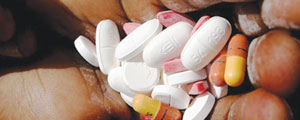
MURAMBINDA – Conrad Kambasha (49) thought his life had come to an end after he tested positive for HIV three years ago.
Report by Phillip Chidavaenzi, Senior Features Writer
Fear became his constant companion because his mindset had been fed with the notion that HIV was a death sentence. He braced himself for a life of stigma, ill-health and ostracisation.
But after he was enrolled on the HIV programme jointly run by government and Medecins Sans Frontieres (MSF), everything changed.
“The community has accepted that HIV can infect anybody. There is no stigma because the medication has ensured that those of us who are infected remain strong and healthy,” Kambasha said.
For many HIV patients on this programme, the availability of anti-retroviral drugs (ARVs) has made life easier.
“The burden (of sickness) has become easier to bear because of the treatment I have been receiving here at Murambinda Mission Hospital,” said Kambasha.
The major challenge, however, is that poor rainfall patterns have meant that villagers could not harvest much. Anti-retroviral therapy (ART) works well with a proper diet.
- Chamisa under fire over US$120K donation
- Mavhunga puts DeMbare into Chibuku quarterfinals
- Pension funds bet on Cabora Bassa oilfields
- Councils defy govt fire tender directive
Keep Reading
“Last season the harvests were poor and there is hunger throughout the area,” said Laiza Mutero (37), who is also on treatment. She has been on ART since 2008.
She comes to collect her medication at the hospital from Rukweza communal lands in Nyazura.
Murambinda Mission Hospital, which is MSF’s project centre, has become a beacon of light and attracts patients from different parts of the country, including Harare, Bulawayo and Mutare. Over 14 000 people are accessing the life-prolonging drugs here after government decentralised the distribution of ARVs.
MSF project co-ordinator for Murambinda, James Mutharia, said they were happy that government has become the major supplier of ARVs through the National Pharmaceutical Company (NatPharm) in the district. Currently, there are 14 430 patients on the ARV programme who receive the drugs at 26 clinics in the district. This, however, is a drop from the initial enrolment of 19 539 since 2006.
“There’s a gap of about 5000. These have moved back to their districts, died or stopped treatment. We have only been able to track 14430 people,” he said. MSF started operating in Murambinda in 2003 where they ran a nutrition programme which they later handed over to government in 2009 following a robust improvement in nutrition among the villagers.
Since the treatment was decentralised to the other outlying clinics in the district, patients no longer had to sleep in the queue at Murambinda Mission Hospital as had become the case.
He added that the only problem was that some of the clinics were too small and did not have enough storage facilities for drugs, which have to be stored in pharmacies to avoid breakages. Drugs require special storage facilities with controlled temperature.
Recently, there was an alert that some drugs supplied by MSF Belgium were crushed, resulting in some of the patients taking either an over- or under-dose. MSF head of mission in Zimbabwe, Fasil Tezera, however allayed fears that HIV patients on ART in the country could be at risk.
Following an instruction from MSF Supply in Belgium, Tezera said they checked their stocks and established that they had not received consignments that matched the batch number of the crushed drugs.











